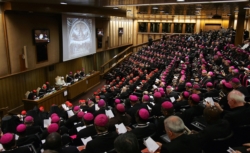Characteristics of a good bishop
St. Augustine, the magnificent fourth-century bishop of Hippo (North Africa), has long been regarded as a model for bishops to emulate. A tireless shepherd and defender of his flock, Augustine embodied the essence of a great bishop.
He was a man of deep prayer and holiness. He was ascetical, Christ-centered, disciplined in his personal habits, joyful, wise, actively involved with the physical and spiritual welfare of his people, and he was a dedicated and effective teacher. He understood that a primary duty of a bishop is to teach the Faith, and teach he did with an amazing vigor and clarity, writing hundreds of substantive and brilliant works, all aimed at instructing and encouraging his fellow Catholics.
What’s more, St. Augustine the bishop was not afraid to teach. In that tumultuous and polarized era, when the formidable heresies of Donatism and Arianism roiled Mediterranean Christians, he indefatigably preached, wrote, admonished, defended, rebuked, and consoled. He even engaged in public debates before large crowds with proponents of heresy, all in an effort to fulfill his duty as a shepherd of souls who defends his flock.
Here are some key Scriptural passages that guided St. Augustine in his efforts to be a good and holy bishop:
Titus 1:7-9 -- “For a bishop, as God’s steward, must be blameless; he must not be arrogant or quick-tempered or a drunkard or violent or greedy for gain, but hospitable, a lover of goodness, master of himself, upright, holy, and self-controlled; he must hold firm to the sure word as taught, so that he may be able to give instruction in sound doctrine and also to confute those who contradict it.”
1 Timothy 3:1-7 -- “If anyone aspires to the office of bishop, he desires a noble task. Now a bishop must be above reproach, the husband of one wife, temperate, sensible, dignified, hospitable, an apt teacher, no drunkard, not violent but gentle, not quarrelsome, and no lover of money. He must manage his own household well, keeping his children submissive and respectful in every way; for if a man does not know how to manage his own household, how can he care for God’s church? He must not be a recent convert, or he may be puffed up with conceit and fall into the condemnation of the devil; moreover he must be well thought of by outsiders, or he may fall into reproach and the snare of the devil.” (Note: the clause, “husband of one wife,” does not mean that a bishop must be married, as some mistakenly imagine. It means that a man who had been remarried after the death of his wife could not be considered as a candidate for bishop. This ecclesiastical discipline was akin to celibacy in the priesthood.)
1 Peter 5:1-5 -- “So I exhort the elders among you, as a fellow elder and a witness of the sufferings of Christ as well as a partaker in the glory that is to be revealed. Tend the flock of God that is your charge, not by constraint but willingly, not for shameful gain but eagerly, not as domineering over those in your charge but being examples to the flock. And when the chief Shepherd is manifested you will obtain the unfading crown of glory.”
2 Timothy 4:1-5: “I charge you in the presence of God and of Christ Jesus who is to judge the living and the dead, and by his appearing and his kingdom: preach the word, be urgent in season and out of season, convince, rebuke, and exhort, be unfailing in patience and in teaching. For the time is coming when people will not endure sound teaching, but having itching ears they will accumulate for themselves teachers to suit their own likings, and will turn away from listening to the truth and wander into myths. As for you, always be steady, endure suffering, do the work of an evangelist, fulfil your ministry.”
St. Augustine was also keenly aware of the Bible’s warnings about unworthy shepherds, those who through laziness or some other iniquity fail to live up to their duty. Here is a sobering example:
Jeremiah 23:1-4: “Woe to the shepherds who destroy and scatter the sheep of my pasture!’ says the Lord. Therefore thus says the Lord, the God of Israel, concerning the shepherds who care for my people: ‘You have scattered my flock, and have driven them away, and you have not attended to them. Behold, I will attend to you for your evil doings, says the Lord. Then I will gather the remnant of my flock out of all the countries where I have driven them, and I will bring them back to their fold, and they shall be fruitful and multiply. I will set shepherds over them who will care for them, and they shall fear no more, nor be dismayed, neither shall any be missing, says the Lord.”
And for a particularly ominous warning to bad shepherds, read what God says in Ezekiel 34:1-16!
Knowing he would one day give an account to God for his time as bishop, St. Augustine once wrote,
“While I am frightened by what I am to you, I am also consoled by what I share with you. For you I am a bishop, with you I am a Christian. The first is the title of the office I received, the second is by grace; the first implies danger, the second salvation.”
So let’s pray fervently, every day, for our bishops, asking God to bless and strengthen them and give them the graces they need to be courageous and effective shepherds. After all, they carry a very heavy load on their shoulders: us.
Patrick Madrid is an author, public speaker, and the publisher of Envoy Magazine. Visit his web site at www.surprisedbytruth.com
Additional Verses: Jeremiah 50:3-6; Ezekiel 34: 1-16; 1 Timothy 3:1-7, 5:22; Hebrews 5:1-4.
Related paragraphs from the Catechism: CCC 873-896, 1555-1561



















